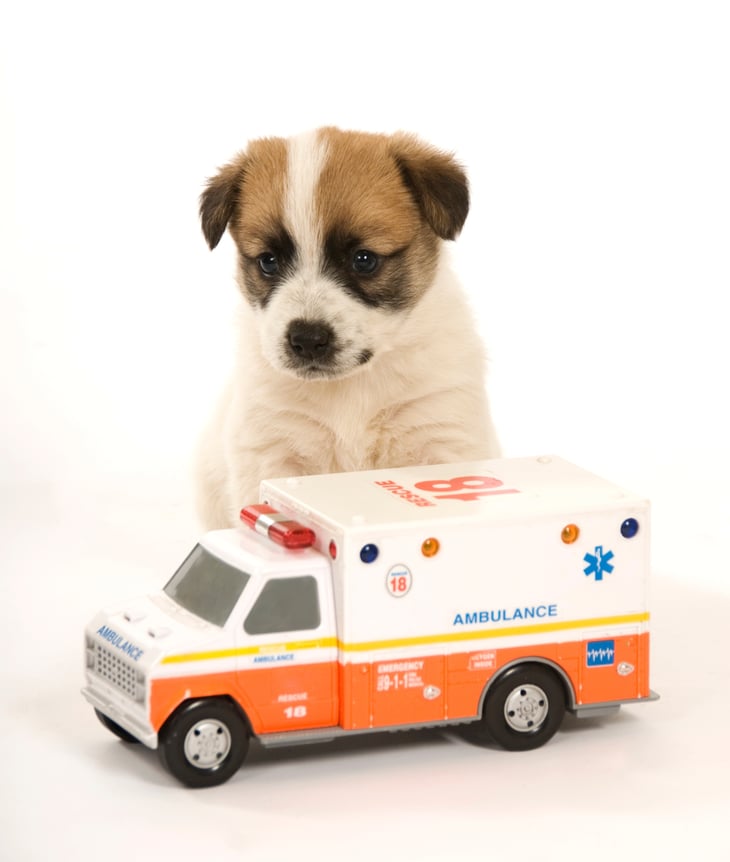 It’s the middle of the night; you wake up to the sound of your pet vomiting. Your heart is pounding as you try to comfort your pet. Is it time to call the vet or is this just another hairball? Is your vet even open on nights, weekends or holidays? How urgent is the problem?
It’s the middle of the night; you wake up to the sound of your pet vomiting. Your heart is pounding as you try to comfort your pet. Is it time to call the vet or is this just another hairball? Is your vet even open on nights, weekends or holidays? How urgent is the problem?
Sometimes the need for immediate medical attention is obvious, but it can be difficult for even the most conscientious pet parent to know whether or not your pet’s symptoms are signs of a true emergency--or whether the symptoms can wait for an appointment with your pet’s veterinarian.
Since our pets can’t tell us when they are hurting, it’s important that we learn to recognize the signs and symptoms of pet distress and what constitutes a true pet emergency--especially in times when your vet may be unavailable. In some emergencies, time is a critical factor and fast action can improve the chances of a positive outcome.
Know The Signs Of A Pet Emergency
The following symptoms should be considered emergencies and require immediate medical attention:
- You suspect or know that your pet has ingested a poisonous substance (chocolate, Xylitol, antifreeze, rodent poison, etc.)
- Bleeding that doesn’t stop within 5 minutes or bleeding from the mouth, nose, or rectum
- Noticeable pain, including limping or favoring one side
- Difficulty breathing, choking, coughing or gagging that does not stop
- Being hit by a car, even if there doesn’t appear to be any injuries
- Seizure
- Collapse/unconsciousness
- Overheating/heat stroke
- Eye injury
- Inability to urinate or defecate, or pain associated with either
- Attacked or bitten by another animal
- Extreme anxiety/disorientation
- Pale or blue gums (associated with low blood pressure)
- Refusal to eat or drink for more than 24 hours
The above symptoms are obvious medical emergencies, but sometimes health problems are lurking beneath the surface that need prompt attention but are not emergencies.
Pay attention to your pet’s demeanor and habits; is he or she sleeping more often? Is Fido suddenly not interested in fetch or does Fluffy no longer find the laser pointer exciting? Make use of your own observations and intuition when deciding whether or not to bring your pet in for a physical examination and diagnosis.
The Next Step
If you’ve determined that your pet is in need of immediate medical attention…now what? Having an emergency preparedness plan in place ahead of time will help you to stay calm, cool, and collected in the face of a pet emergency. And most emergency hospitals can help you (day, night, weekends or holidays) make a determination on the phone about whether you need to come in immediately based on observation of your pet’s symptoms. We also recommend having your pet’s carrier in a convenient location to save time should your pet need transport to emergency care.
Make sure you have your vet’s phone number plus an after-hours pet emergency number in your phone or easily available. Our free VitusVet app finds all nearby Pet Emergency Hospitals and their information for you--especially handy for those after-hours and holiday emergencies. It also gathers and stores your pet’s complete medical records on your phone to ensure that you have them on hand for reference day or night. We developed VitusVet app for exactly this situation when a pet needs fast attention and information is critical.



